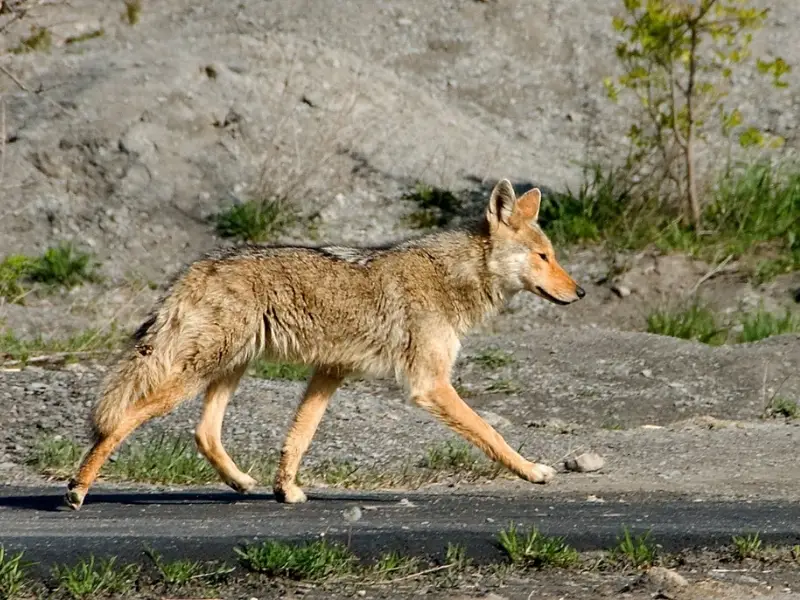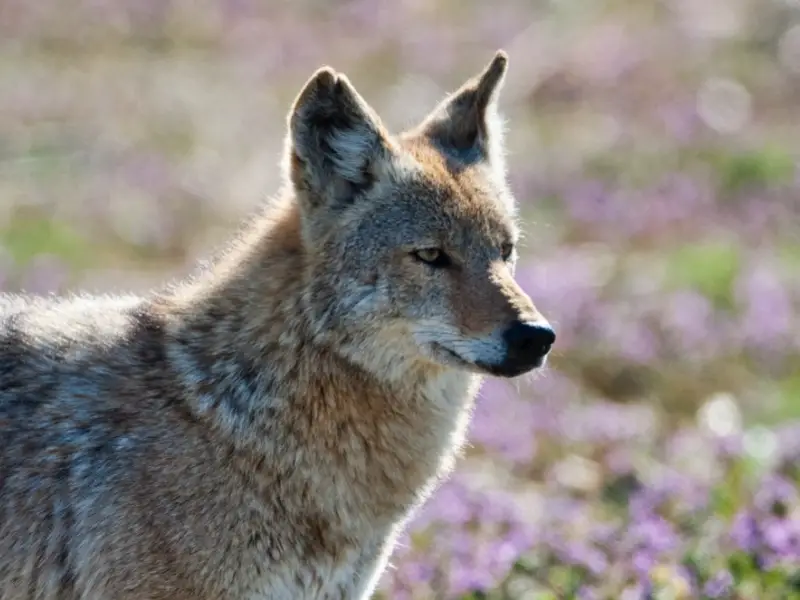Coyotes aren’t just found in the wild. With their narrow faces, pointed ears, long, black-tipped tails, and fur that varies from gray to light brown, coyotes actually look like a medium sized dog (think collie or German shepherd). And mistaking a coyote for a friendly dog could end in disaster for your pet rabbit.
So do these predators eat rabbits?
Coyotes aren’t picky with what they eat. As opportunistic predators and scavengers, about three-quarters of a coyote’s diet consists of eating small mammals. Thus, a coyote will kill and eat a rabbit, whether this is in the wild or in your backyard if your rabbit isn’t kept safe.
Moreover, coyotes are found in 49 states in the United States. That’s in every state except Hawaii. This isn’t quite as surprising when considering that this predator is very adaptable.
While there are efforts underway to control the coyote population, the numbers continue to rise. This poses a serious question: is your rabbit safe? And if not, what can you do to protect your bunny?
Do Coyotes Prey on Rabbits?
Found across North America, in 99% of the U.S. states and also the plains, forests, mountains, and deserts of Canada, it seems like coyotes live everywhere. They can be found in the wild as well as in urban settings.
Coyotes are omnivores even though they prefer to eat meat over plants and vegetables. A large part of their diet consists of small animals, such as squirrels, mice, rats, lizards, and rabbits. Coyotes also eat fruits, eggs, birds, vegetables, snakes, fish, and insects.
Occasionally, a coyote may prey on a larger animal like an elk, bison, or moose.
When it isn’t actively hunting for food, a coyote is also a scavenger and carrion eater that feasts on the meat of already dead animals.
In urban and suburban areas, coyotes are even more opportunistic. No pet is safe, and this includes pet rabbits, cats, and small dogs. Coyotes will also feast on what edibles they can find in your trash can and any fruits and veggies that have fallen from garden shrubs.
A study that analyzed the droppings of urban coyotes found that 60-75% of a coyote’s food sources included ornamental fruits like grapes, loquat, and ficus, garbage, and domestic cats. This doesn’t mean your rabbit is safe. These predators also eat rodents and rabbits when the opportunity presents itself.
Another study found that small rodents make up 42% of a coyote’s diet in urban areas. This is followed by fruit, whilte-tailed deer, and rabbits (at 18%).
Why Do Coyotes Eat Rabbits?
Since the meat is rich in vitamin B12 and E, as well as containing a higher concentration of various minerals, it isn’t surprising that coyotes eat rabbits. These small mammals are a great source of nutrition for these predators.
Moreover, coyotes are opportunistic animals. This means they are highly adaptable and will pretty much eat anything if it results in survival. Thus, rabbits are not off the menu.
Are Rabbits Easy to Catch by Coyotes?
Coyotes aren’t called nature’s tricksters for no reason. These animals are highly intelligent, and this is evident in their growing population and ability to adapt to most environments.
Interestingly, these predators will only take down an animal that’s easy to kill as it won’t risk death or injury.
They hunt alone if their prey are small animals; however, they also hunt in packs for larger prey. Coyotes stay as silent as they can while stalking their prey so the animal isn’t easily alerted to their presence. Plus, they also don’t want to let other animals know that they’ve spotted their next meal.
After they’ve stalked their prey and found the right moment to pounce, coyotes attack, kill, and eat their prey.
As nocturnal animals, coyotes are mostly active at night and in the early mornings. However, they are opportunistic, so it isn’t strange for them to hunt during the day too if there’s food to be found.
This then brings us to the question of whether rabbits are easy to catch. If taken by surprise, yes, a rabbit will be easy to catch. But rabbits also have a strong sense of sight and sound, so it is likely that a rabbit will know a predator is nearby.
The bite force per pound of a coyote is only 153, which is similar to that of a medium breed dog. A rabbit’s bite force measures at 70, so a coyote’s bite does have more force.
However, a bunny has the ability to latch on and do serious damage when a predator tries to dislodge it. And with sharp claws, a bunny can defend itself well.
So, it may be easy for a coyote to attack a bunny if it is caught off guard or if the coyote makes its way into the hutch where your bunny can’t get away.
Ways to Protect Your Rabbits From Coyotes

There are several methods to protect your bunny so it doesn’t become a coyote’s next meal:
Cut Bushes and Shrubs
Bushes and shrubs give protection and hiding spots for a coyote, so to minimize this, cut down any dense bushes and weeds that you can.
Make Your Yard Unappealing
No, we don’t mean you should ugli-fy your backyard. Making your yard unappealing for predators involves leaving no water and pet food out and ensuring your trash bags are safely stored in a container or trash can that contains the predator-attracting smell.
Install motion-detecting lights. This deters nocturnal animals like coyotes and keeps them off your property.
Keep Rabbits Indoors
Not always possible, but keeping your rabbit indoors keeps it safe. If your bunny needs to exercise outside, ensure that you are there to supervise.
Predator-Proof the Hutch
If your rabbit needs to stay outside, make sure that the hutch is sturdy and no predator can make its way inside.
Your rabbit’s hutch should be made from solid wood. This includes the floor, the sides, and the roof.
For the windows, enforce these with wire mesh or a heavy-duty chain link so no predator can gain entry and dine on your Mr Bugs.
Use bolts for the gate and hutch door. Latches are easy to open; if your child can figure out how to unlatch a door, then a clever predator can too.
The Last Bite
Knowing how to distinguish a coyote from a medium size dog is one of the first steps to keeping your beloved Ms Fluffles safe. Then, know when these predators are active (at night mostly) and how they hunt and attack.
This information helps you keep your bunny safe.
There are many other rabbit predators out there that you should be aware of. Check out these articles:

